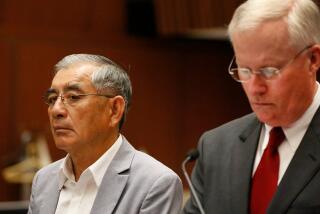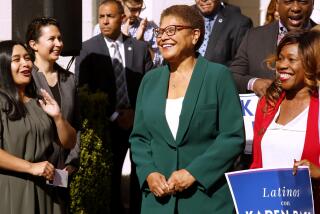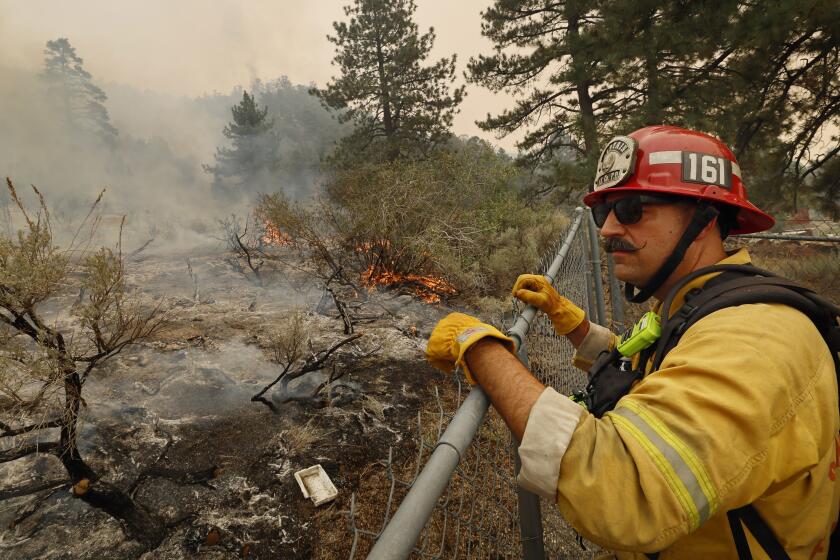First & Spring: Big money arrived too late for L.A. election debate
Two years ago, a defining issue in Los Angeles’ mayoral election was campaign money — more specifically, the huge amounts spent by the union that represents most Department of Water and Power employees.
Mayor Eric Garcetti won the race after repeatedly pointing out that a group affiliated with the union had spent more than $3 million to support his opponent, then-City Controller Wendy Greuel. He made TV commercials on the issue, which ran around the clock in the campaign’s final days.
The DWP union kept a much lower profile in this year’s city election. But that doesn’t mean it stopped spending. Instead, it gave a $25,000 donation at the last minute, when it was too late to become an issue for voters.
The campaign behind Charter Amendments 1 and 2, which changed L.A.’s election dates and gave some officials an extra 18 months in office, reported its funding from the DWP union 90 minutes before the polls closed, according to city records. That money was part of a larger phenomenon in this year’s campaign season: big contributions that arrived too late to be disclosed on mailers or, in some cases, too late even to be part of the public debate.
Citizens for Increased Voter Participation, the group backing the two ballot measures, reported getting more than $172,000 in donations on election day or the day after. Those last-minute funds made up more than 40% of the campaign’s large contributions of $1,000 or more. Such donations must be reported within 24 hours to the city Ethics Commission, which posts the information on its website.
The Times reported last month that a campaign committee promoting City Council candidate Steve Veres sent out six mailers without mentioning who its major donors were, as is typically required. A campaign backing the reelection of Councilwoman Nury Martinez sent two mailers without mentioning any large contributors.
On election day, Citizens for Increased Voter Participation revealed a burst of five-figure contributions. One donor leases office space to the city; a second represents oil energy companies fighting local bans on fracking, a controversial form of oil and gas extraction; a third received $17.5 million in city financial assistance to build residential towers in Koreatown.
Voters overwhelmingly passed Charter Amendments 1 and 2, both spearheaded by council President Herb Wesson, so increased disclosure almost certainly wouldn’t have changed the outcome. Nevertheless, the campaign’s handling of its donations could set the tone for future elections, making last-minute donations more common and leaving voters even more in the dark.
Laura Lake, a Westwood neighborhood leader, said the last-minute donations showed a lack of respect for the electorate from backers of the charter amendments. “People are entitled to know who’s backing a candidate or a measure,” she said. “That’s why we put all these safeguards on the books.”
Political consultant John Shallman handled Greuel’s mayoral bid two years ago. His company, Shallman Communications, worked for the campaign for the two charter amendments, which shifted L.A. elections from odd- to even-numbered years. His other consulting firm, West Coast Public Affairs, was paid by the outside committees that supported Veres and Martinez.
Dave Jacobson, a Shallman spokesman, said last month that the committees backing Martinez and Veres did not list major contributors on their first batch of mailers because they had not yet received any large donations. On Friday, Jacobson said the consulting firm had no responsibility for the timing of the contributions supporting Charter Amendments 1 and 2.
“We are media consultants and aren’t in any way involved in compliance work,” he said in an email. “Any suggestion otherwise is false.”
Kathay Feng, co-chair of the ballot measure campaign, defended the group’s handling of its financial disclosures. Contributions were reported on election day, she said, because the campaign was working until the last minute to get the money it needed. “It was nerve-racking in the last two weeks to still be chasing the donations,” she said.
Political consultant Eric Hacopian had a different take, saying it’s “not normal” to have such a large volume of contributions during the last 48 hours of the campaign. “You can’t spend that kind of money in that kind of a time frame in any useful way, unless you knew it was coming in,” he said.
Los Angeles places limits on fundraising by individual candidates: $700 per donor for council candidates who represent legislative districts, $1,400 for citywide offices. But donations of any size are allowed for ballot measure campaigns and “independent expenditure” committees — groups that spend their money separate and apart from their favored candidates.
With big contributions now a regular feature of L.A. elections, disclosure becomes one of the only meaningful forms of regulation available to the public. But tracing that money to its origin has become increasingly difficult. In one instance, a committee with ties to Big Tobacco managed to weigh in on behalf of Charter Amendments 1 and 2.
Keep CA Strong, a Sacramento-based committee, spent $1,750 to promote Charter Amendments 1 and 2, Martinez and four college board candidates on a mailer sent to some San Fernando Valley voters. Former Assemblyman Raul Bocanegra, a Martinez ally, has raised money for that committee, according to a spokesman for Martinez.
This year, Keep CA Strong reported donations totaling $52,000 from three sources: brewer Anheuser-Busch; a Political Action Committee backed by the real estate industry; and Altria Client Services, which provides financial services to cigarette maker Philip Morris USA.
Those connections are difficult to make from looking at the Ethics Commission’s website, which is quick to post last-minute expenditures made by and for political campaigns. That’s because the mailers themselves never mentioned Keep CA Strong — or its financial backers.
Feng, who runs the nonprofit public interest group California Common Cause, said the bigger issue is finding a way to curtail the huge contributions that flow during campaign season. That won’t happen, she said, until advocates succeed in changing the makeup of the U.S. Supreme Court, which has labeled that type of money free speech. “There’s very few things we can do to make [unlimited contributions] illegal, and it is frustrating,” she said.
Lake, the Westwood civic leader, said she too is unhappy with the current system. But she sees a link between the public’s inability to track campaign money and the weak turnout on election day.
“This is the poster child for why people don’t vote,” Lake said. “Because the game is rigged.”
Follow @DavidZahniser for more news from L.A. City Hall.
More to Read
Sign up for Essential California
The most important California stories and recommendations in your inbox every morning.
You may occasionally receive promotional content from the Los Angeles Times.











